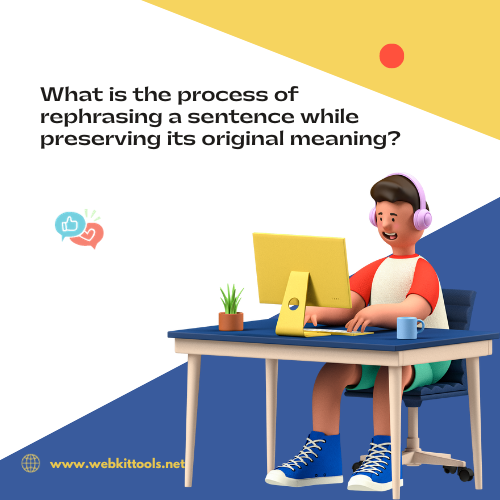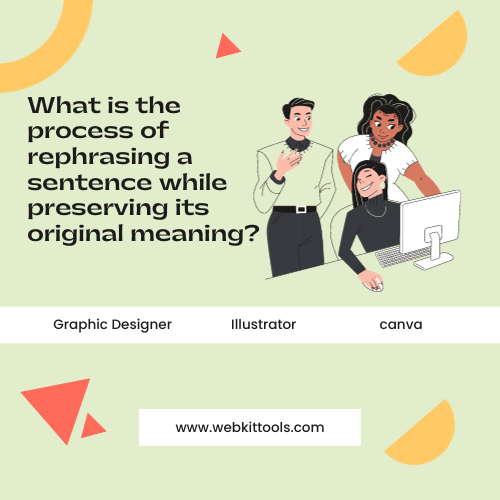What is the process of rephrasing a sentence while preserving its original meaning?
.png)
Crafting content that resonates with meaning and clarity is undoubtedly an art form. To captivate and retain an audience, impactful writing demands both skill and focused attention. However, an even more intricate endeavor, requiring heightened expertise and engagement, is the task of rephrasing pre-existing sentences or texts while preserving their inherent significance.
The process of rewording content, whether a single sentence or an entire paragraph, without altering its intended meaning presents a formidable challenge. Students are advised to incorporate quotations in their revised versions to avoid unnecessary redundancy within the content.
Many individuals find themselves in this predicament. They avoid the labor of rewriting content and appending quotes from alternative sources, as stipulated in the original material.
Those who are unfamiliar with the intricacies of retaining a sentence's essence during rephrasing can find valuable insights in this blog. It offers a range of tips and techniques to help ensure accurate sentence restructuring. Further details are outlined below:
Harness More Potent Synonyms
As previously mentioned, the process of rewriting content necessitates skillful manipulation of sentences to uphold their fundamental intent. The optimal approach involves immersing oneself in the sentence's significance.
For more extensive content, multiple readings of the entire paragraph aid in grasping its contextual essence. Subsequently, a careful review of the sentence unveils its pivotal terms.
Once these terms are identified, the next step involves their replacement with suitable synonyms. Choose synonyms that seamlessly substitute the original words. It's worth noting that the meaning of a word in isolation might diverge from its contextual meaning within a sentence. The same principle applies to its various synonyms.
Eliminate Extraneous Words
Rewriting content involves crafting succinct sentences that retain the original meaning while discarding superfluous words. Effective rephrasing requires an understanding of the reader's perspective.
Omitting words that lengthen sentences won't alter their intended import. Scan the text for redundant determiners and modifiers. Identify and eliminate them. Pay special attention to redundant pairs of unnecessary words to render sentences concise and impactful.
Alter the Sentence Structure
Another crucial technique for rephrasing sentences without altering their core meaning involves altering their structure. For example, changing passive voice to active voice or vice versa.
This structural alteration allows for sentence rephrasing while avoiding the pitfalls of plagiarism and grammatical errors. Confirm that the sentence maintains its originality, or utilize an online plagiarism checker for verification.
Divide Lengthy Sentences
Occasionally, sentences become so lengthy that comprehending them becomes a challenge. Opt for either rephrasing or dividing them into smaller segments to enhance reader comprehension. Lengthy sentences can often be created by combining two meaningful phrases that convey similar meanings independently.
Inserting a period (".") between these segments facilitates sentence division. The word "which" is frequently found in such lengthy sentences. These sentences can be split into two distinct, meaningful sentences. Replace "which" with a demonstrative pronoun and a noun to initiate the following sentence while preserving meaning. Similarly, lengthy sentences containing words like 'while' and 'despite' can be divided by placing periods between phrases, rendering them meaningful sentences.
Invert Conditional Sentences
The primary objective of inverting conditional sentences is to remove or omit the word "if." After this removal, words like 'Should,' 'Were,' and 'Had' are introduced. This inversion imparts a more polite tone to conditional sentences without altering their significance.
The word "Should" signifies the first condition, addressing actual circumstances. The opening part of the construction represents the current status, while the subsequent segment reflects the subsequent outcome.
Sentences incorporating 'were' and 'had' pertain to hypothetical scenarios, where certain outcomes were plausible based on an assumed condition. Mastering the art of inverting conditional sentences enhances rephrasing skills and amplifies their effectiveness.
Leverage AI-powered Article Rewriters
Rewriting sentences or entire passages demands a substantial investment of time, skill, and attention. This task becomes even more challenging when deadlines for submission or publication are imminent. In such situations, relying solely on personal efforts might fall short. The most effective recourse is to utilize a proficient AI-powered article rewriter tool.
This tool employs AI algorithms and machine learning libraries to comprehend the contextual nuances of written content, facilitating accurate rephrasing while preserving original meaning.






